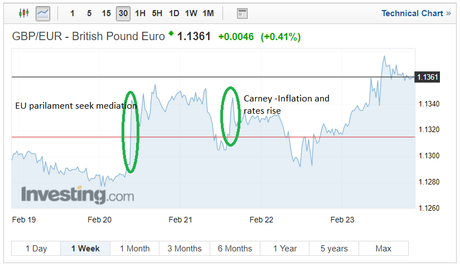This week saw sterling strengthen nicely this week with the GBP/EUR surpassing 1.13 and GBP/USD finding support above the 1.39 level but struggling to reach 1.40. The majority of Sterling FX rates progress was fueled by comments from the EU parliament who have called for more convivial Brexit talks following this week’s continued negotiations. In recent days Sterling FX Rates were also affected by comments from monetary policy member Ramsden, deputy to Mark Carney and Carney himself.
EU parliament offers olive branch
The GBP received a welcome boost in the early part of this week after slipping below 1.13 to a month low 1.1227 following the UK’s disappointing manufacturing figures. The GBP strength followed news which illustrated that the EU parliament was preparing a detailed 60-page dossier in order to ensure more flexibility surrounding Brexit talks. It is understood the dossier is being offered as an ‘association agreement’ and offers benefits such as access to the single market.
The association agreement is used by the European Union to establish beneficial relationships with other nations. For example, the framework has been successfully implemented between Ukraine and the EU allowing Ukraine to enjoy elements of the single market. In particular benefits of financial services and customs.
It would appear therefore that the EU is now willing to cooperate and be a lot more flexible with the UK. Consequently, under the EU new proposal, the UK could potentially discuss the opportunity of security and customs cooperation plus potentially retain access to the single market and financial passporting.
Whilst the EU parliaments new stance will conflict with Michel Barnier’s approach who leans more towards a Canada style trade agreement.
Market makers viewed the EU’s more forthcoming approach positively and Sterling FX rates gained strength following news circulation of the ‘association agreement’. If the agreement is formally extended to the UK it will also most certainly be met with disdain by hardcore Brexiteers in the conservative party who will be averse to certain conditions of the associated agreement. Although the agreement encapsulates many of the key points that the UK desires it would also mean that the UK would have to follow certain levels of regulation which could prove a no go and impede any agreement getting final approval from the cabinet.
Latest updates on Brexit negotiations – following Chequers meetings
Brexit talks reconvened this week with both sides meeting at Chequers. It is understood talks went positively, however, the outcome of the conservative cabinet talks will be crucial. Whilst the Netherlands prime minister underlined that PM May needed to be clear on exactly what outcome she wants to achieve from the second round of talks.
Mark Rutte prime minster of the Netherlands stated – “to be as clear as possible on what she (PM May) wants to achieve on the second phase of negotiations”
It is understood that the UK is continuing along the line of negotiation with a ‘Canada Plus Plus’ deal whereby the UK would benefit from a free trade agreement, services and customs deal plus benefit from close regulatory understanding.
Whilst cabinet conversations held at Chequers were understood to be high level and were agreed by the cabinet, it is understood that much has been left on the table for discussion.
Mrs May will now return to the twenty-seven EU nations and provide an overview of exactly what the UK is looking to get from their future partnership with the EU.
Pro Brexit Tories make requests by letter to PM May
Before the cabinet met at Chequers to discuss and draft the proposal which will be verbally delivered to the twenty-seven EU nations, a gaggle of Eurosceptic Tory MP’s sent a letter to PM May outlining their demands. The letter was spearheaded by Jacob Rees-Mogg and signed by 60 current or ex-ministers.
Their key wishes included that the UK has the freedom to broker new trade agreements with other nations. They also wish that the UK remains autonomous from a regulatory standpoint and the UK has the ability to change and make its own laws.
It was understood that the courier Included suggestions to ensure that the UK secures a successful Brexit.
The letter publicly will do little to endorse Thresa May essentially undermining and insinuating a naivety in regard to the crunch negotiations. Regrettably, for Theresa May the PM requires the support of her MP’s in order to avoid triggering a vote of no confidence. In recent months the PM has endured continual scrutiny in order to keep hold of power and keep Brexit rolling she will need to bite her tongue and pacify the Pro Brexit club.
Bank of England – Mark Carney and MPC member David Ramsden speak
This week also included speeches from Governor Mark Carney and his deputy David Ramsden. Firstly, Mark Carney spoke at Regents University, the topic leadership and values. Averting away from topic Carney spoke on the UK’s departure from the EU and wanted to assure that regulators were planning on speaking to financial institutions with minimum delay ensuring that they received:
“the benefit of the doubt, beyond the last minute”.
He also confirmed that the UK and EU were working tirelessly to ensure the full detail of the transitional deal was in place before the end of March.
Carney spoke again on Wednesday as the BOE delivered the quarterly inflation hearing. Carney adopted a much more hawkish tone, insinuating that rates would indeed be raised again in order to curb inflation. The nod towards further rate hike lifting Sterling FX Rates against the Dollar and Euro.
Speculators are now believing that the next UK interest rate rise could happen as early as May, with a further rise before the end of the year. This approach was also underlined by the BOE chief economist who stated in his report that:
“I think there is the potential for greater than expected momentum in both global and UK growth and inflation,”.
Carney also dealt the news that real wages were 3.5% lower than the BOE predicted in 2016 pre-EU referendum due to higher than desired inflation and minimal wage growth.
Governor Carney’s deputy David Ramsden also spoke during the week at an event held by the Confederation of British Industry. Deputy Governor Ramsden highlighted the weak predicted growth in the UK economy, which is estimated to be around 1.5%. The deputy highlighted:
‘The dampening effect of Brexit on productivity growth – both through the effect of uncertainty on business investment in the short run and through the need to anticipate and respond to post-Brexit trading relationships – is likely to continue for some time.’
The speech saw a slight uptick in the Pound but was far from the main driver for Sterling FX Rates this week.
Sterling FX rates performance this week
The pound has once again bounced around this week, aggravated by Brexit hearsay and speculation and the prospect of a potential rate hike to curb its high inflation levels. Sterling FX rates fell significantly following the latest round of manufacturing data which highlighted that the sector forecasts had fallen short of expectations. Sterling FX rates have fallen as low as 1.1227 so the news that the EU parliament was plotting a more amicable Brexit transition lifted GBP/ EUR from 1.1294 to 1.1340.

The GBP/EUR enjoyed further gains as Carney talked interest rate hikes and his chief economist speculated about future growth prospects. When markets closed on Friday Sterling Euro was at 1.1361 slipping slightly from the week high of 1.1377 which followed MPC member Ramsdens speech. GBP/USD is still seeing some resistance at 1.40 and closed on Friday at 1.3975
Sterling FX rates, however, could again be on the slide. The latest comments coming from Donald Tusk, this weekend in relation to the UK’s wish for a Canada plus plus arrangement be met with a stern response. The President of European council warning that he believes the UK having their cake and eating it mentality was still alive and the president warning that an a la carte access to the single market.

